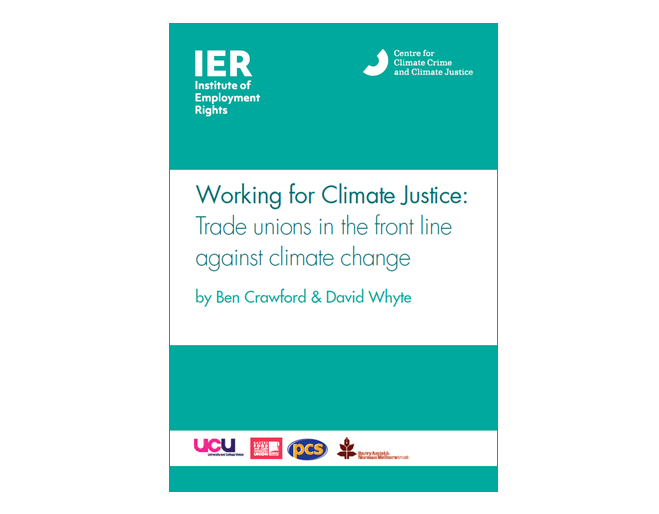David Whyte
David Whyte is Professor of Socio-legal Studies at the University of Liverpool. He has written several publications on health and... Read more »
Ben Crawford
Grantham Research Institute on Climate Change at the London School of Economics

Until now, the trade union movement has failed to make climate change a core concern of their bargaining agendas. This means that a powerful bulwark against climate change is not being put into action. It also means that a potentially crucial source of trade union power and influence is not being utilised.
Two weeks ago, when British Steel announced that they would be switching from high carbon coal power to low carbon electric arc furnaces at their plant in Scunthorpe, critics noted that this would enable the owners of the company to axe up to 2,000 jobs. The reason those jobs will be axed is only partly because of the enhanced capacity for automation in the use of electric arc technology. More importantly, this is opportunism on the part of profit hungry corporate group that is owned by a multinational based in China. In this sense, ‘transition’ is not the most important motivating factor here: it is the capacity for new technology to cut costs and to demobilise the workforce. To add insult to injury, British steel have asked for a £500 million handout from the government to cut those jobs.
Rhetoric around the idea of a ‘just transition’ for workers and communities affected by decarbonization is now decades old. This narrative has driven expectations that decarbonization will provide quality, secure and well paid ‘green jobs’. Yet, as the British Steel example shows, low carbon energy and industry is developing according to an old and familiar model. Union responses to the steel proposals show a different path is possible. Unite’s campaign argues for job protection within the process of decarbonization and calls for social ownership of the energy grid as part of a shift to socially capture the cost benefits of the shift to renewables.
This joining up of workplace, social and environmental interests through a worker led transition is in stark contrast to a process driven by the interests of multinational corporations. At the same time, as recent events have demonstrated, we cannot trust the political class any more than the owners of capital to deliver on meaningful climate action. The same Conservative politicians that will no doubt approve the British Steel subsidy to establish electric arc furnaces are falling over themselves to attack other areas of climate policy.
UK trade unions are increasingly – if belatedly – waking up to the imperatives of climate action and the need for worker led approaches. Working for climate justice: trade unions on the front line against climate change explores this trend as part of a deeper history of worker environmentalism going back to the industrial revolution and anti-colonial struggles against the commodification of both labour and nature. We argue that coordinated union responses are needed, both to drive the transition through the skills and organizational capacity of workers in the workplace, and to challenge the capitalist exploitation of labour and nature.
This requires a mobilization of unions research and education capacities for developing pro-climate industrial strategies, and cross-union and sector coordination of environmental organizing to build bargaining power across companies and supply chains. When workers have strong bargaining power, they can push back against unsustainable working practices. We argue that there is a hidden or ‘secret’ secret solidarity between workers and ‘nature’: it is in general interests of both to slow down the speed of production processes which generate social and environmental harms.
At the same time, we argue conditions of precarity in the workplace and the labour market are incompatible with the transition to sustainable production models. An externalised, vulnerable, and transitory workforce enjoying few rights are unlikely to be able to develop and apply their skills towards the transition to genuinely sustainable production models. We cannot develop new ways of working, organising energy, food, water, clothing and essential services in ways that protect the natural world if they remain based on a system of labour that forces costs and working conditions down, moves to where people can be exploited the most, and encourages the deployment of both labour and capital in ways that accelerate climate change. Workers and trade unions need to identify and articulate the links between precarity and unsustainable production as part of climate industrial action.
Current policy responses to climate change are failing to deliver on emissions targets and social and environmental sustainability. Securing a meaningful transition that locks in worker and community benefits requires mobilization of workers interests, capabilities and skills. Innovative models are emerging within trade unions in the UK and internationally. Trade unionists must engage with these models to take build power for a worker led transition.
Ben Crawford is a Research Officer at LSE and David Whyte is Professor of Climate Justice at Queen Mary University of London. They are authors of a new publication Working for Climate Justice, published on 23rd November 2023.
David Whyte is Professor of Socio-legal Studies at the University of Liverpool. He has written several publications on health and... Read more »
Grantham Research Institute on Climate Change at the London School of Economics